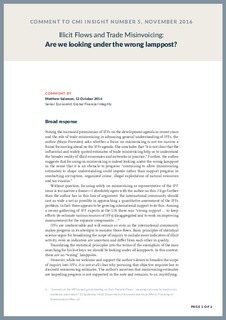Comment to CMI insight number 5: Illicit Flows and Trade Misinvoicing: Are we looking under the wrong lamppost?
Original version
Bergen: Chr. Michelsen Institute (CMI Insight no. 5) 2 p.Abstract
This is a comment to the CMI Insight number 5, published November 2016. The Insight can be found here. Comment by Matthew Salomon, 12 October 2016 Senior Economist, Global Financial Integrity Broad response Noting the increased prominence of IFFs on the development agenda in recent years and the role of trade misinvoicing in advancing general understanding of IFFs, the author (Maya Forstater) asks whether a focus on misinvoicing is not too narrow a frame for moving ahead on the IFFs agenda. She concludes that “it is not clear that the influential and widely quoted estimates of trade misinvoicing help us to understand the broader reality of illicit economies and networks in practice.” Further, the author suggests that focusing on misinvoicing is indeed looking under the wrong lamppost in the sense that it is an obstacle to progress: “continuing to allow [misinvoicing estimates] to shape understanding could impede rather than support progress in combatting corruption, organized crime, illegal exploitation of natural resources and tax evasion.” Without question, focusing solely on misinvoicing as representative of the IFF issue is too narrow a frame—I absolutely agree with the author on this. I’d go further than the author has in this line of argument: the international community should cast as wide a net as possible in approaching a quantitative assessment of the IFFs problem. In fact, there appears to be growing international support to do this. Among a recent gathering of IFF experts at the UN there was “strong support … to keep efforts (to estimate various sources of IFFs) disaggregated and to work on improving measurement for the separate components …” {1} IFFs are unobservable and will remain so even as the international community makes progress in its attempts to monitor those flows. Basic principles of statistical science argue for broadening the scope o
